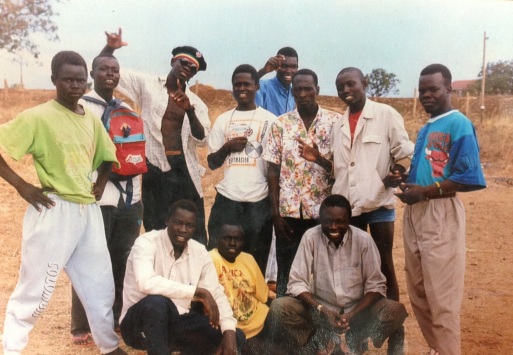“I am not lost from God, I’m lost from my parents”
“I have been called a lost boy but I am not lost from God, I’m lost from my parents.” Abraham Yel Nhial
Wilfreid and I in Portland, Maine in April 2014
Long before I knew that I would one day live in South Sudan, I became familiar with the plight of the “Lost Boys of Sudan.” In 2003, a documentary was release that told the story of Sudanese boys from the southern region of Sudan that were forced to flee their villages during the Second Sudanese Civil War. The boys initially ended up in a refugee camp in Ethiopia but were force to flee again when the Ethiopian government collapsed. During their years on the run, many of the boys died of lack of food and water, were forced to fight as child soldiers and were attacked by animals that prowled the African landscape. Eventually the boys who survived that horrific ordeal ended up in a refugee camp in Kenya after crisscrossing Sudan. The film crew also followed the boys as they were invited to start a new life in various cities in the United States. These boys would initially struggle to fit into the new American culture but many of them eventually graduated from high school and college and pursued professional careers. When Sudanese citizens living in Southern Sudan voted in 2011 to separate from Sudan and form the world’s newest nation, many of these “lost boys” returned to their homeland to contribute to the building of the new nation.
When I arrived in South Sudan in August of 2013, my desk mate was a South Sudanese named Wilfreid. Wilfreid is quiet and south spoken and has a great sense of humor. Over the course of my short time in South Sudan, Wilfreid and I discussed everything from college and professional American football to the 2013 World Series (he was delighted that the Boston Red Sox won the 2013 World Series). I started to piece together Wilfreid’s story and discovered that he was a “lost boy” who went to the United States in 1994. The oldest of seven children, Wilfreid’s parents were killed in the civil war. His parents were refugees when he was born, and when they repatriated to Sudan, the Second Sudanese Civil War begun. Young Wilfreid was only eleven years old. By the time he was seventeen years old he had lived in displacement camps inside Sudan, jailed by the government in Khartoum, escaped and lived in refugee camps in Uganda and Kenya, and finally came to the United States in 1994. Once in the United States, Wilfreid completed his education and received a scholarship to attend the University of Maine. In 2002, he received his Bachelor of Arts in International Relations and quickly returned to Portland, Maine where he volunteered in the South Sudanese community. In 2004, Wilfreid was able to cast his vote in the US elections after obtaining his American citizenship. He also continued his education receiving his Masters from Southern New Hampshire University.
Wilfreid (Standing 2nd from Right) with other “Lost Boys” in the refugee camp (circa 1993)
After eighteen years, Wilfreid returned to South Sudan to start a youth development project. The project engages war-affected youth ex-combatants in reconciliation, conflict resolution, and reconstruction of the country through building and construction projects while, at the same time, providing basic education, job training, and leadership practice. With the help of Rotary clubs in the United States, Wilfreid was able to build a library in his village that currently houses 1,000 books. In addition, Wilfreid started working at the National Legislative Assembly as a research assistant. It was in this position that he became familiar with the work of the International Republican Institute (IRI). In January of 2013 he joined IRI’s Governance team building the organizational capacity of national legislators and a few months later I had the pleasure of sharing a desk with Wilfreid.
In any great novel the next section would be the biography or if this was a feature length movie based on the journey of the “lost boys”, the credits would start rolling. How can you top the story of a person that overcomes war, famine and perpetual displacement and eventually returns to his homeland? But we live in a broken world and after a short time of being back in his home country, a conflict erupted that force Wilfreid (and many other South Sudanese) to flee for the second time. But this time, he had a family waiting in Maine for him to return. In Portland, his wife and two young sons waited patiently for dad to return home. Last month, I had the pleasure of visiting Wilfreid in Portland, Maine and meeting his lovely family. While my time in South Sudan was short and it is highly unlikely that I will return to South Sudan with the International Republican Institute, I have been encouraged and blessed by all the people I have met through this experience.
This is one of my favorite quotes –
Some people come into our lives and quickly go.
Some people move our souls to dance.
They awaken us to understanding with the passing whisper of their wisdom.
Some people make the sky more beautiful to gaze upon.
They stay in our lives for a while,
leave footprints on our hearts,
and we are never, ever the same.
[Anonymous]
It best describes my brief time in in the world’s newest nation…I have been encouraged by the people and their ability to persevere despite horrific circumstances, frustrated by the cultural differences that sometimes presented me with unusual challenges, and saddened by the senseless deaths and overwhelming displacement of South Sudan citizens. And because of this experience, I will never, ever be the same…


